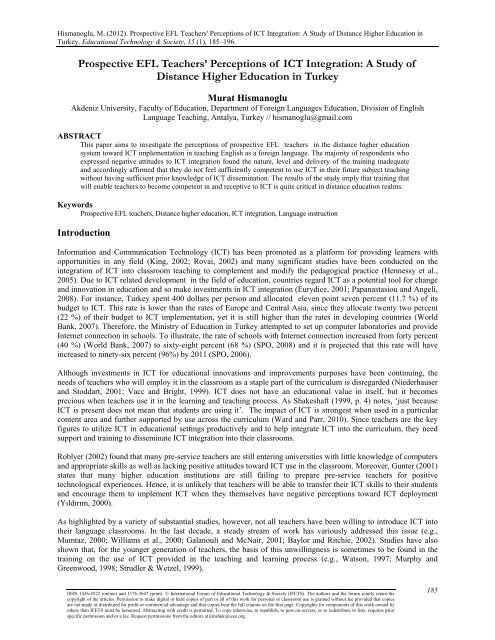January 2012 Volume 15 Number 1 - Educational Technology ...
January 2012 Volume 15 Number 1 - Educational Technology ...
January 2012 Volume 15 Number 1 - Educational Technology ...
Create successful ePaper yourself
Turn your PDF publications into a flip-book with our unique Google optimized e-Paper software.
Hismanoglu, M. (<strong>2012</strong>). Prospective EFL Teachers' Perceptions of ICT Integration: A Study of Distance Higher Education in<br />
Turkey. <strong>Educational</strong> <strong>Technology</strong> & Society, <strong>15</strong> (1), 185–196.<br />
Prospective EFL Teachers’ Perceptions of ICT Integration: A Study of<br />
Distance Higher Education in Turkey<br />
Murat Hismanoglu<br />
Akdeniz University, Faculty of Education, Department of Foreign Languages Education, Division of English<br />
Language Teaching, Antalya, Turkey // hismanoglu@gmail.com<br />
ABSTRACT<br />
This paper aims to investigate the perceptions of prospective EFL teachers in the distance higher education<br />
system toward ICT implementation in teaching English as a foreign language. The majority of respondents who<br />
expressed negative attitudes to ICT integration found the nature, level and delivery of the training inadequate<br />
and accordingly affirmed that they do not feel sufficiently competent to use ICT in their future subject teaching<br />
without having sufficient prior knowledge of ICT dissemination. The results of the study imply that training that<br />
will enable teachers to become competent in and receptive to ICT is quite critical in distance education realms.<br />
Keywords<br />
Prospective EFL teachers, Distance higher education, ICT integration, Language instruction<br />
Introduction<br />
Information and Communication <strong>Technology</strong> (ICT) has been promoted as a platform for providing learners with<br />
opportunities in any field (King, 2002; Rovai, 2002) and many significant studies have been conducted on the<br />
integration of ICT into classroom teaching to complement and modify the pedagogical practice (Hennessy et al.,<br />
2005). Due to ICT related development in the field of education, countries regard ICT as a potential tool for change<br />
and innovation in education and so make investments in ICT integration (Eurydice, 2001; Papanastasiou and Angeli,<br />
2008). For instance, Turkey spent 400 dollars per person and allocated eleven point seven percent (11.7 %) of its<br />
budget to ICT. This rate is lower than the rates of Europe and Central Asia, since they allocate twenty two percent<br />
(22 %) of their budget to ICT implementation, yet it is still higher than the rates in developing countries (World<br />
Bank, 2007). Therefore, the Ministry of Education in Turkey attempted to set up computer laboratories and provide<br />
Internet connection in schools. To illustrate, the rate of schools with Internet connection increased from forty percent<br />
(40 %) (World Bank, 2007) to sixty-eight percent (68 %) (SPO, 2008) and it is projected that this rate will have<br />
increased to ninety-six percent (96%) by 2011 (SPO, 2006).<br />
Although investments in ICT for educational innovations and improvements purposes have been continuing, the<br />
needs of teachers who will employ it in the classroom as a staple part of the curriculum is disregarded (Niederhauser<br />
and Stoddart, 2001; Vacc and Bright, 1999). ICT does not have an educational value in itself, but it becomes<br />
precious when teachers use it in the learning and teaching process. As Shakeshaft (1999, p. 4) notes, ‘just because<br />
ICT is present does not mean that students are using it’. The impact of ICT is strongest when used in a particular<br />
content area and further supported by use across the curriculum (Ward and Parr, 2010). Since teachers are the key<br />
figures to utilize ICT in educational settings productively and to help integrate ICT into the curriculum, they need<br />
support and training to disseminate ICT integration into their classrooms.<br />
Roblyer (2002) found that many pre-service teachers are still entering universities with little knowledge of computers<br />
and appropriate skills as well as lacking positive attitudes toward ICT use in the classroom. Moreover, Gunter (2001)<br />
states that many higher education institutions are still failing to prepare pre-service teachers for positive<br />
technological experiences. Hence, it is unlikely that teachers will be able to transfer their ICT skills to their students<br />
and encourage them to implement ICT when they themselves have negative perceptions toward ICT deployment<br />
(Yıldırım, 2000).<br />
As highlighted by a variety of substantial studies, however, not all teachers have been willing to introduce ICT into<br />
their language classrooms. In the last decade, a steady stream of work has variously addressed this issue (e.g.,<br />
Mumtaz, 2000; Williams et al., 2000; Galanouli and McNair, 2001; Baylor and Ritchie, 2002). Studies have also<br />
shown that, for the younger generation of teachers, the basis of this unwillingness is sometimes to be found in the<br />
training on the use of ICT provided in the teaching and learning process (e.g., Watson, 1997; Murphy and<br />
Greenwood, 1998; Strudler & Wetzel, 1999).<br />
ISSN 1436-4522 (online) and 1176-3647 (print). © International Forum of <strong>Educational</strong> <strong>Technology</strong> & Society (IFETS). The authors and the forum jointly retain the<br />
copyright of the articles. Permission to make digital or hard copies of part or all of this work for personal or classroom use is granted without fee provided that copies<br />
are not made or distributed for profit or commercial advantage and that copies bear the full citation on the first page. Copyrights for components of this work owned by<br />
others than IFETS must be honoured. Abstracting with credit is permitted. To copy otherwise, to republish, to post on servers, or to redistribute to lists, requires prior<br />
specific permission and/or a fee. Request permissions from the editors at kinshuk@ieee.org.<br />
185

















